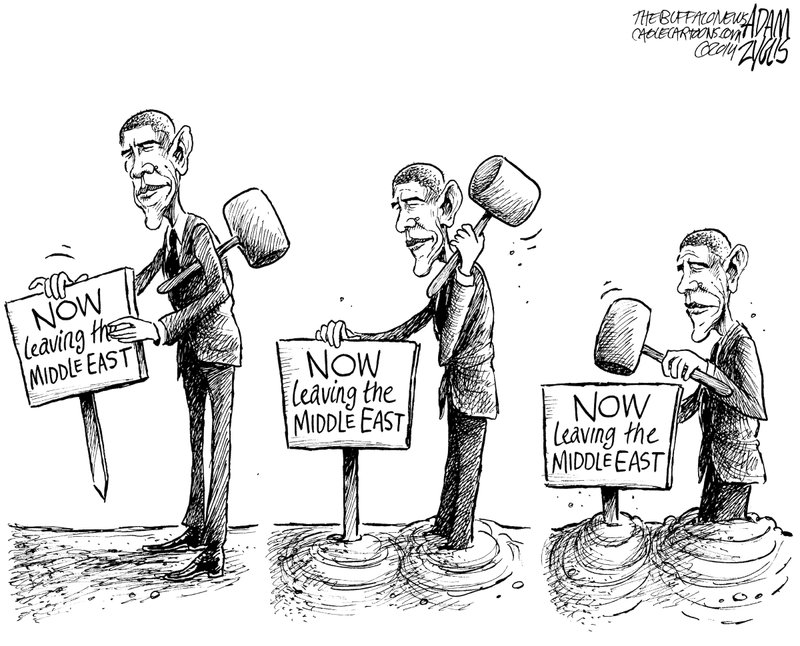Everyone wants to go to war against the Islamic State (ISIS or ISIL) or militant groups such as Khorasan. Except they don't.
Is this war-weary nation ready to enter yet another and possibly prolonged conflict?
Despite war weariness and "Iraq fatigue," there have been signs another major U.S. military intervention may occur. Or not.
Congress approved funds and equipment for Syrian "rebels." However, congressional and political leaders have danced around the issue of authorizing military force against the Islamic State. Even though some are calling for such action, they don't want Congress to take up that issue and force them to take a stand -- at least for now, in the midst of a political campaign season.
Meanwhile, some staunch opponents of President Obama who have argued that he has regularly exceeded presidential authority are urging him to undertake military action -- even though Congress has not explicitly authorized such action.
But the Obama administration says it has the authorization. Apparently, Obama is using the congressional authorizations President George W. Bush relied on more than a decade ago to go to war. (As a senator from Illinois in 2007, Obama sponsored a resolution to prohibit Bush from taking military action against Iran unless authorized by Congress. His proposal died in committee.) But Obama has made no effort to ask Congress to explicitly authorize action against the Islamic State. And many in Congress don't want to be asked -- at least for now -- despite indications in recent opinion polls, that, even after two extremely costly and demoralizing wars, the public would support a stronger U.S. role against Islamic militants.
A growing number favor a more active and muscular American role, according to a USA Today/Pew Research survey. Fifty-four percent say Obama is not tough enough on national security issues and only 39 percent approve his foreign policy.
But the public is conflicted over how much the United States should and can do. We try to do too much in the views of 39 percent of Americans, while 31 percent say it's too little.
Despite recent heavy bombing in Syria and Iraq, Obama is seen as very cautious. But that's not necessarily a bad trait when momentous decisions are involved. And, not surprisingly, he also appears conflicted.
He pledges to degrade and destroy the Islamic State. However, he says American forces "will not have a combat mission," though he "will not hesitate to take action against ISIL" in Syria and Iraq, which already includes air strikes. And he told U.S military personnel, "I will not commit you and the rest of our armed forces to fighting another ground war in Iraq."
But Gen. Martin Dempsey, chairman of the Joint Chiefs of Staff, told a Senate committee, "If we reach the point where I believe our advisers should accompany Iraqi troops on attacks against specific ISIL targets, I'll recommend that to the president."
The House (273-156) and Senate (73-22) approved funding to assist the Syrian "rebels," with all members of the Arkansas delegation in favor. In a somewhat bizarre twist, however, Rep. Tom Cotton blasted his opponent, Sen. Mark Pryor, for favoring passage of the measure; in effect, for voting the same way Cotton voted. Cotton has long supported a more assertive and active U.S. role in the region and accused Pryor of flip-flopping and being "weak and unsteady" on national security.
Cotton's criticism of Pryor was because he had earlier opposed such funding (before the ISIS outrages came to light). Pryor, in now supporting funding, said he still has reservations but circumstance had changed and the recent bill provides for more accountability.
Viewed within the perspective of the current battle for election to the Senate between these two, it brings to mind Cotton's defense of his vote against legislation authorizing funding for Arkansas Children's Hospital, which has stirred considerable controversy. He told Atlantic magazine, "I ultimately did support later versions of the legislation, and I fully support Children's Hospital, of course."
It's possible that after the November election Congress may confront the broader issue of U.S. military involvement. Or not, depending on the outcome.
Some may even argue that there should be a declaration of war, a process that has become a relic of the past, with no such formality since World War II.
President Obama has assembled a coalition, but will it sustain? We need to know who we are fighting for or with and keep in mind the dangers of mission creep and blowback, and understand the shortcomings of the Iraqi forces we have spent billions training and equipping. All too often we have overestimated the will and fighting capability of those we support.
Sen. John McCain faults the administration for not explicitly asking for congressional approval on the larger strategy. "This is going to be an extended conflict, and they're going to need an authorization." His Republican colleague Rand Paul says, "We need to stay the heck out of their civil war." Another Republican, Ted Cruz, says Obama should seek congressional approval before escalating the campaign against Islamic extremists," but added that there should be an "overwhelming campaign to take them out."
Once again we find ourselves being interjected into complicated civil wars and sectarian conflicts. And contradictions and artful dodging are laced throughout what passes for a debate about momentous decisions.
HOYT PURVIS IS A JOURNALISM AND INTERNATIONAL RELATIONS PROFESSOR.
Commentary on 09/26/2014

